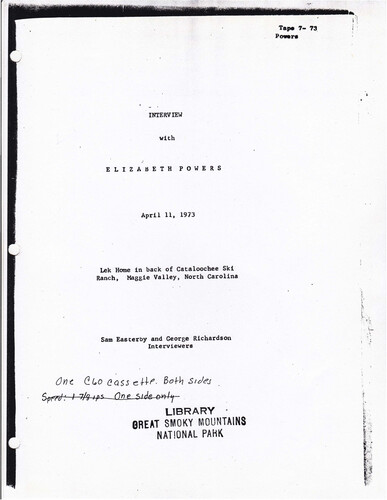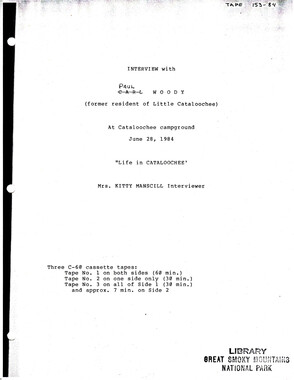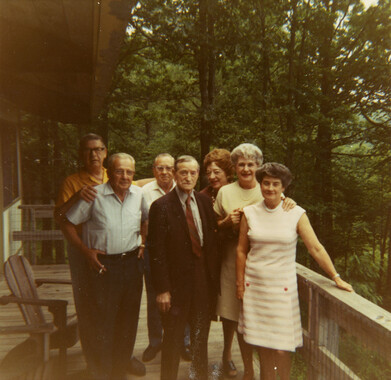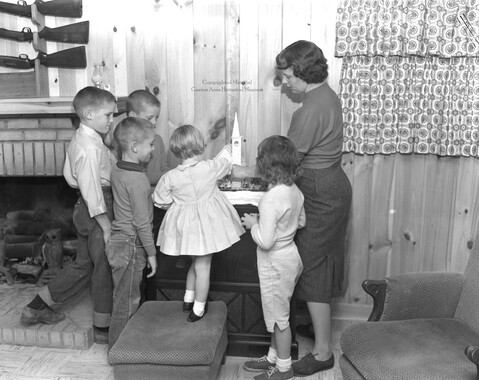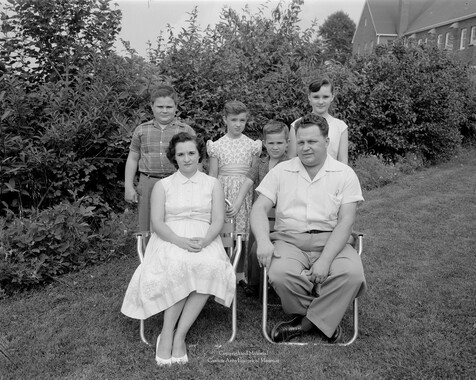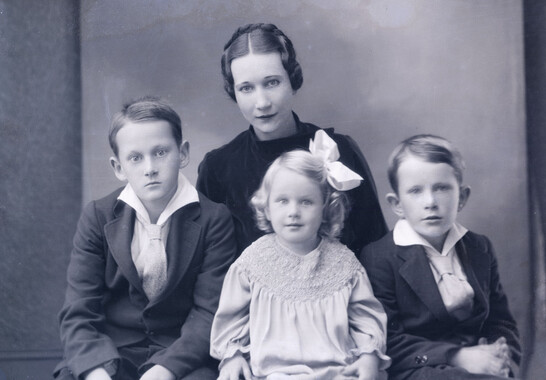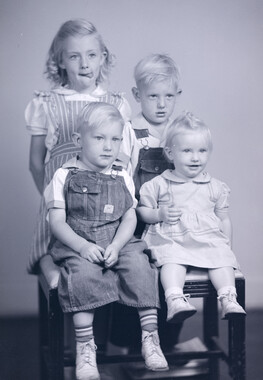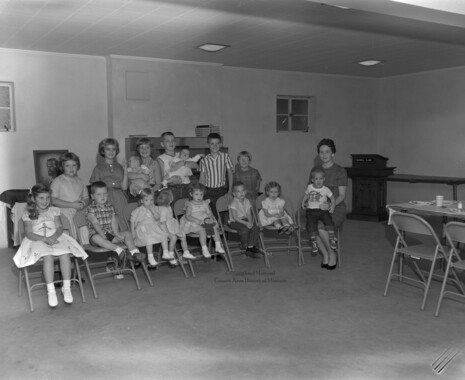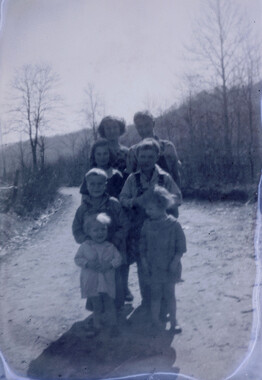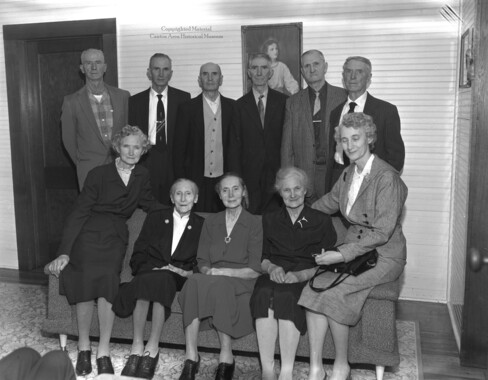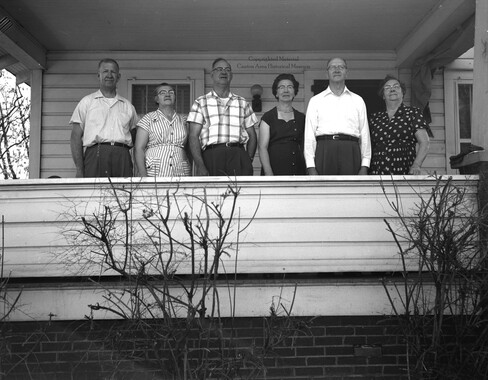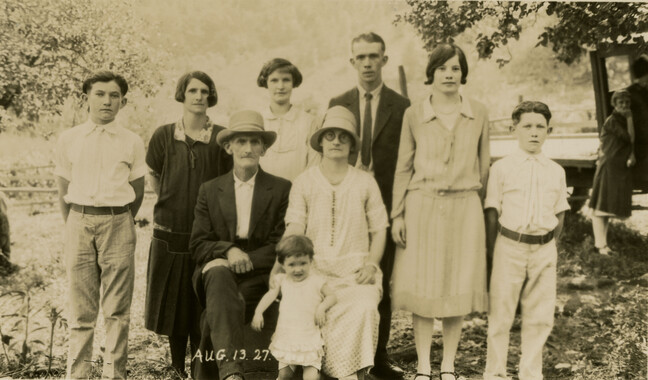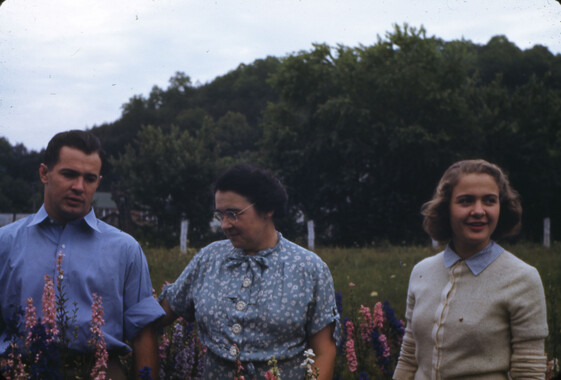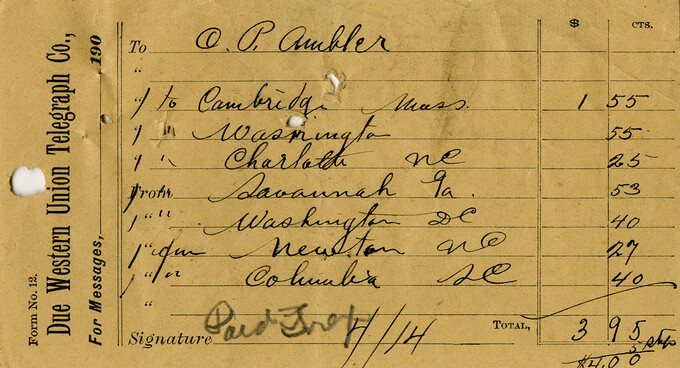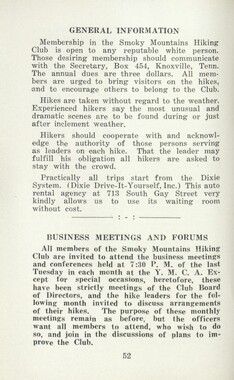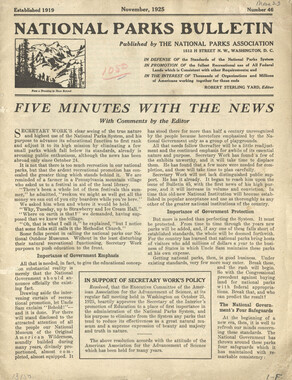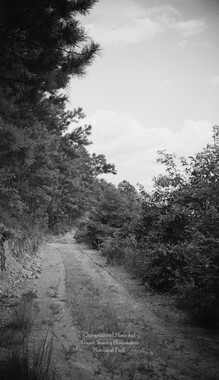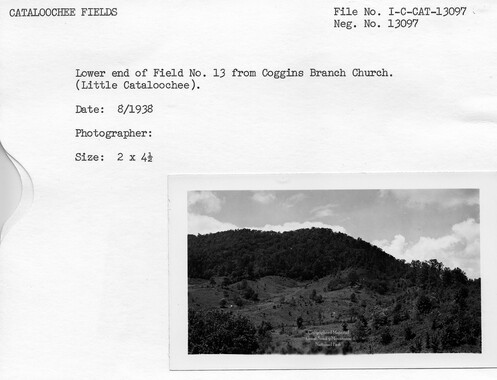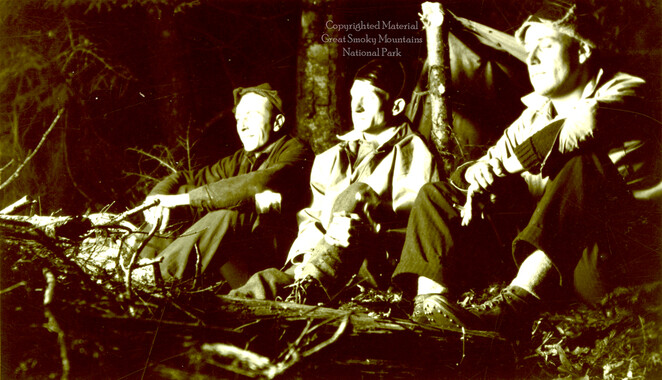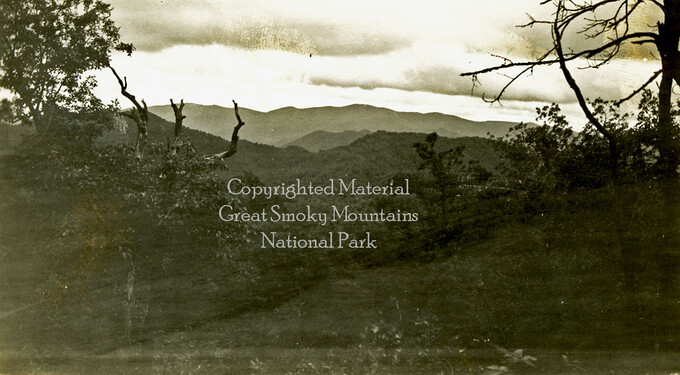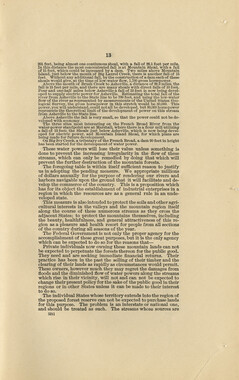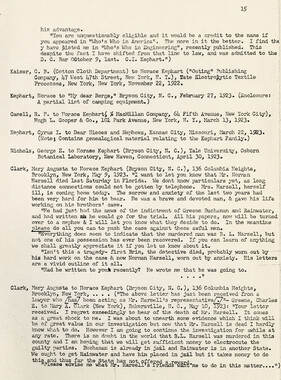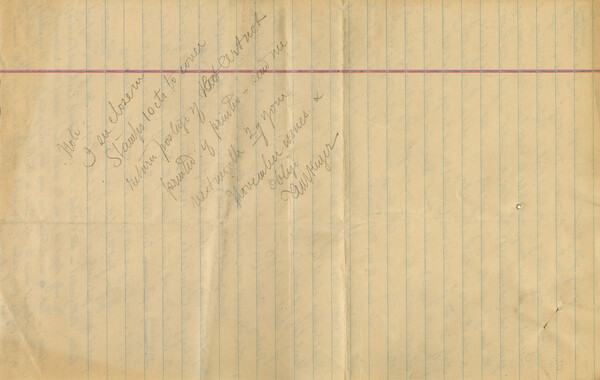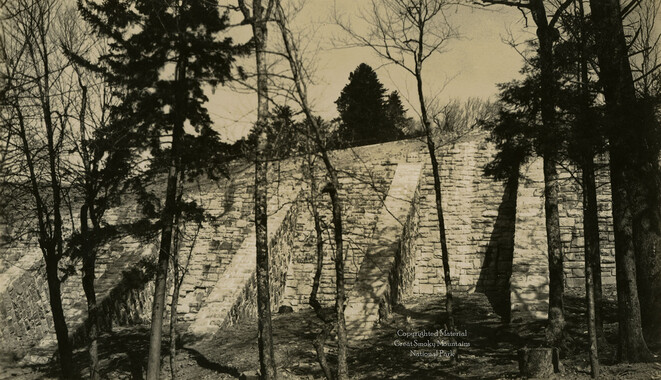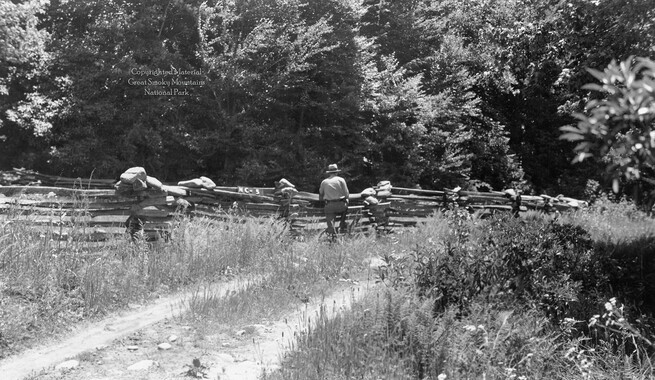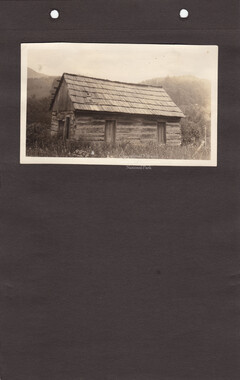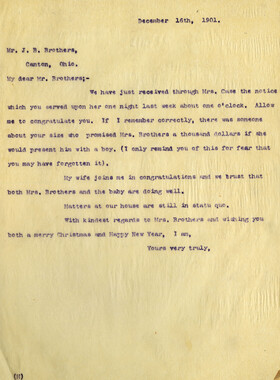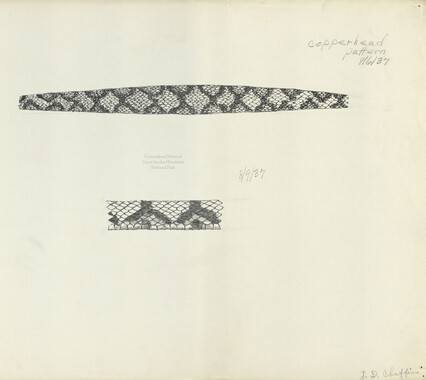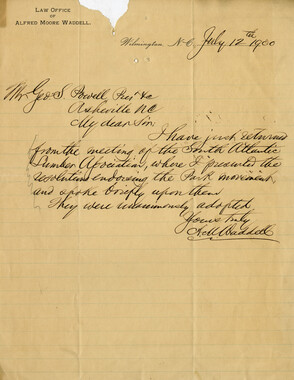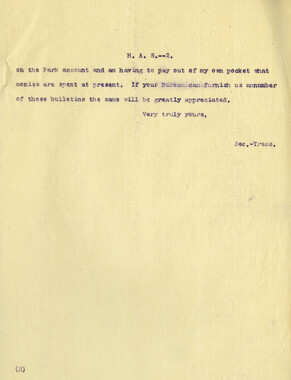Western Carolina University (9)
View all
- Canton Champion Fibre Company (9)
- Great Smoky Mountains - A Park for America (192)
- Highlights from Western Carolina University (1)
- Journeys Through Jackson (12)
- Oral Histories of Western North Carolina (7)
- Picturing Appalachia (3)
- Stories of Mountain Folk (2)
- Western Carolina University Publications (153)
- Western North Carolina Regional Maps (2)
- Cherokee Traditions (0)
- Civil War in Southern Appalachia (0)
- Craft Revival (0)
- Horace Kephart (0)
- LGBTQIA+ Archive of Jackson County (0)
- Travel Western North Carolina (0)
- Western Carolina University Fine Art Museum Vitreograph Collection (0)
- Western Carolina University Herbarium (0)
- Western Carolina University: Making Memories (0)
- Western Carolina University Restricted Electronic Theses and Dissertations (0)
- World War II in Southern Appalachia (0)
University of North Carolina Asheville (0)
View all
- Faces of Asheville (0)
- Forestry in Western North Carolina (0)
- Grove Park Inn Photograph Collection (0)
- Isaiah Rice Photograph Collection (0)
- Morse Family Chimney Rock Park Collection (0)
- Picturing Asheville and Western North Carolina (0)
- Appalachian National Park Association (1)
- Kephart, Horace, 1862-1931 (1)
- Masa, George, 1881-1933 (3)
- North Carolina Park Commission (98)
- Weaver, Zebulon, 1872-1948 (2)
- Wilburn, Hiram Coleman, 1880-1967 (64)
- Allanstand Cottage Industries (0)
- Bennett, Kelly, 1890-1974 (0)
- Berry, Walter (0)
- Brasstown Carvers (0)
- Cain, Doreyl Ammons (0)
- Carver, George Washington, 1864?-1943 (0)
- Cathey, Joseph, 1803-1874 (0)
- Champion Fibre Company (0)
- Champion Paper and Fibre Company (0)
- Cherokee Indian Fair Association (0)
- Cherokee Language Program (0)
- Crittenden, Lorraine (0)
- Crowe, Amanda (0)
- Edmonston, Thomas Benton, 1842-1907 (0)
- Ensley, A. L. (Abraham Lincoln), 1865-1948 (0)
- Fromer, Irving Rhodes, 1913-1994 (0)
- George Butz (BFS 1907) (0)
- Goodrich, Frances Louisa (0)
- Grant, George Alexander, 1891-1964 (0)
- Heard, Marian Gladys (0)
- Kephart, Calvin, 1883-1969 (0)
- Kephart, Laura, 1862-1954 (0)
- Laney, Gideon Thomas, 1889-1976 (0)
- McElhinney, William Julian, 1896-1953 (0)
- Niggli, Josephina, 1910-1983 (0)
- Osborne, Kezia Stradley (0)
- Owens, Samuel Robert, 1918-1995 (0)
- Penland Weavers and Potters (0)
- Rhodes, Judy (0)
- Roberts, Vivienne (0)
- Roth, Albert, 1890-1974 (0)
- Schenck, Carl Alwin, 1868-1955 (0)
- Sherrill's Photography Studio (0)
- Smith, Edward Clark (0)
- Southern Highland Handicraft Guild (0)
- Southern Highlanders, Inc. (0)
- Stalcup, Jesse Bryson (0)
- Stearns, I. K. (0)
- Thompson, James Edward, 1880-1976 (0)
- United States. Indian Arts and Crafts Board (0)
- USFS (0)
- Vance, Zebulon Baird, 1830-1894 (0)
- Western Carolina College (0)
- Western Carolina Teachers College (0)
- Western Carolina University (0)
- Western Carolina University. Mountain Heritage Center (0)
- Whitman, Walt, 1819-1892 (0)
- Williams, Isadora (0)
- 1850s (1)
- 1860s (1)
- 1870s (4)
- 1880s (3)
- 1890s (3)
- 1900s (10)
- 1910s (8)
- 1920s (102)
- 1930s (128)
- 1940s (24)
- 1950s (7)
- 1960s (2)
- 1970s (17)
- 1980s (8)
- 1990s (14)
- 2000s (31)
- 1600s (0)
- 1700s (0)
- 1800s (0)
- 1810s (0)
- 1820s (0)
- 1830s (0)
- 1840s (0)
- 2010s (0)
- 2020s (0)
- Appalachian Region, Southern (5)
- Buncombe County (N.C.) (2)
- Great Smoky Mountains National Park (N.C. and Tenn.) (16)
- Haywood County (N.C.) (167)
- Jackson County (N.C.) (1)
- Swain County (N.C.) (3)
- Asheville (N.C.) (0)
- Avery County (N.C.) (0)
- Blount County (Tenn.) (0)
- Cherokee County (N.C.) (0)
- Clay County (N.C.) (0)
- Graham County (N.C.) (0)
- Henderson County (N.C.) (0)
- Knox County (Tenn.) (0)
- Knoxville (Tenn.) (0)
- Lake Santeetlah (N.C.) (0)
- Macon County (N.C.) (0)
- Madison County (N.C.) (0)
- McDowell County (N.C.) (0)
- Mitchell County (N.C.) (0)
- Polk County (N.C.) (0)
- Qualla Boundary (0)
- Rutherford County (N.C.) (0)
- Transylvania County (N.C.) (0)
- Watauga County (N.C.) (0)
- Waynesville (N.C.) (0)
- Yancey County (N.C.) (0)
- Clippings (information Artifacts) (18)
- Guidebooks (1)
- Interviews (10)
- Land Surveys (102)
- Letters (correspondence) (8)
- Manuscripts (documents) (44)
- Maps (documents) (23)
- Photographs (93)
- Portraits (30)
- Publications (documents) (31)
- Scrapbooks (2)
- Sound Recordings (1)
- Transcripts (12)
- Aerial Photographs (0)
- Aerial Views (0)
- Albums (books) (0)
- Articles (0)
- Artifacts (object Genre) (0)
- Bibliographies (0)
- Biography (general Genre) (0)
- Cards (information Artifacts) (0)
- Copybooks (instructional Materials) (0)
- Crafts (art Genres) (0)
- Depictions (visual Works) (0)
- Design Drawings (0)
- Drawings (visual Works) (0)
- Envelopes (0)
- Exhibitions (events) (0)
- Facsimiles (reproductions) (0)
- Fiction (general Genre) (0)
- Financial Records (0)
- Fliers (printed Matter) (0)
- Glass Plate Negatives (0)
- Internegatives (0)
- Memorandums (0)
- Minutes (administrative Records) (0)
- Negatives (photographs) (0)
- Newsletters (0)
- Newspapers (0)
- Notebooks (0)
- Occupation Currency (0)
- Paintings (visual Works) (0)
- Pen And Ink Drawings (0)
- Periodicals (0)
- Personal Narratives (0)
- Plans (maps) (0)
- Poetry (0)
- Postcards (0)
- Programs (documents) (0)
- Questionnaires (0)
- Sayings (literary Genre) (0)
- Sheet Music (0)
- Slides (photographs) (0)
- Songs (musical Compositions) (0)
- Specimens (0)
- Speeches (documents) (0)
- Text Messages (0)
- Tintypes (photographs) (0)
- Video Recordings (physical Artifacts) (0)
- Vitreographs (0)
- Appalachian National Park Association Records (2)
- Cataloochee History Project (64)
- George Masa Collection (9)
- Historic Photographs Collection (31)
- Horace Kephart Collection (3)
- Love Family Papers (7)
- Map Collection (1)
- Zebulon Weaver Collection (3)
- A.L. Ensley Collection (0)
- Appalachian Industrial School Records (0)
- Axley-Meroney Collection (0)
- Bayard Wootten Photograph Collection (0)
- Bethel Rural Community Organization Collection (0)
- Blumer Collection (0)
- C.W. Slagle Collection (0)
- Canton Area Historical Museum (0)
- Carlos C. Campbell Collection (0)
- Cherokee Studies Collection (0)
- Daisy Dame Photograph Album (0)
- Daniel Boone VI Collection (0)
- Doris Ulmann Photograph Collection (0)
- Elizabeth H. Lasley Collection (0)
- Elizabeth Woolworth Szold Fleharty Collection (0)
- Frank Fry Collection (0)
- Gideon Laney Collection (0)
- Hazel Scarborough Collection (0)
- Hiram C. Wilburn Papers (0)
- Humbard Collection (0)
- Hunter and Weaver Families Collection (0)
- I. D. Blumenthal Collection (0)
- Isadora Williams Collection (0)
- Jesse Bryson Stalcup Collection (0)
- Jim Thompson Collection (0)
- John B. Battle Collection (0)
- John C. Campbell Folk School Records (0)
- John Parris Collection (0)
- Judaculla Rock project (0)
- Kelly Bennett Collection (0)
- Major Wiley Parris Civil War Letters (0)
- McFee-Misemer Civil War Letters (0)
- Mountain Heritage Center Collection (0)
- Norburn - Robertson - Thomson Families Collection (0)
- Pauline Hood Collection (0)
- Pre-Guild Collection (0)
- Qualla Arts and Crafts Mutual Collection (0)
- R.A. Romanes Collection (0)
- Rosser H. Taylor Collection (0)
- Samuel Robert Owens Collection (0)
- Sara Madison Collection (0)
- Sherrill Studio Photo Collection (0)
- Smoky Mountains Hiking Club Collection (0)
- Stories of Mountain Folk - Radio Programs (0)
- The Reporter, Western Carolina University (0)
- Venoy and Elizabeth Reed Collection (0)
- WCU Gender and Sexuality Oral History Project (0)
- WCU Mountain Heritage Center Oral Histories (0)
- WCU Oral History Collection - Mountain People, Mountain Lives (0)
- WCU Students Newspapers Collection (0)
- Western North Carolina Tomorrow Black Oral History Project (0)
- William Williams Stringfield Collection (0)
- Church buildings (5)
- Civilian Conservation Corps (U.S.) (6)
- Forest conservation (1)
- Great Smoky Mountains National Park (N.C. and Tenn.) (7)
- Logging (2)
- Maps (14)
- Storytelling (1)
- African Americans (0)
- Appalachian Trail (0)
- Artisans (0)
- Cherokee art (0)
- Cherokee artists -- North Carolina (0)
- Cherokee language (0)
- Cherokee pottery (0)
- Cherokee women (0)
- College student newspapers and periodicals (0)
- Dams (0)
- Dance (0)
- Education (0)
- Floods (0)
- Folk music (0)
- Forced removal, 1813-1903 (0)
- Forests and forestry (0)
- Gender nonconformity (0)
- Hunting (0)
- Landscape photography (0)
- Mines and mineral resources (0)
- North Carolina -- Maps (0)
- Paper industry (0)
- Postcards (0)
- Pottery (0)
- Railroad trains (0)
- Rural electrification -- North Carolina, Western (0)
- School integration -- Southern States (0)
- Segregation -- North Carolina, Western (0)
- Slavery (0)
- Sports (0)
- Waterfalls -- Great Smoky Mountains (N.C. and Tenn.) (0)
- Weaving -- Appalachian Region, Southern (0)
- Wood-carving -- Appalachian Region, Southern (0)
- World War, 1939-1945 (0)
- Sound (1)
- StillImage (96)
- Text (152)
- MovingImage (0)
Interview with Elizabeth Powers about Cataloochee homeplace
-
This 41-page manuscript is titled “Interview with Elizabeth Powers.” The 1973 interview recalls a Cataloochee homeplace. The history was collected as part of the Cataloochee History Project that collected photographs, stories, and oral histories about families who lived in the Cataloochee Valley. Today’s Cataloochee Valley is within the Great Smoky Mountains National Park. While, in general, the Great Smoky Mountains region was sparsely populated, the Cataloochee Valley remained an exception. By 1900, the population of Cataloochee had grown to 1,000 residents living in hundreds of log and frame homes.
-
-
INTERVIEW with E L I Z A H E T H P 0 W E R S April 11, 1973 Lek Home in back of Cataloochee Ski Ranch, Maggie Valley, North Carolina Sam Easterby and George Richardson Interviewers vC:::p _,r.zrrt. tI .r 1I ?/o .'Jl S 77 7J r LIBRARY BREAT SMOKY MOUNTAINS NATIONAL PAHK i Tape 7- 73. i : Powre .. \-· ;, \ ·! • . .. IN REPLY REFER TO: ,, UNITED STATES DEPARTMENT OF THE INTERIOR NATIONAL PARK SERVICE Great Smoky Mountains National Park Gatlinburg, Tennessee 37738 N-0-T- I-C-E No part of this manuscript may be quoted for publication except by written permission of the Superintendent of the Great Smoky Mountains National Park. Ali material flush with che left. hand margm is that of Ms. Powers. Material block indenced () spaces) is that of one interviewer. Material olock indented (10 spaces) is that of the other incerviewer. Note: The interviewers' voices are so similar that it was difficult to distinguish one from the other. It is hoped that their remarks have ueen separated at least. This has been taken off on a Wollensak 3M oU20 player. The index counter number /UOO/ in the body of the text indicates an omission because it was not understood. The index counter number (000} in the margin is a reference po1.nt. This has been transcribed verbat.im et There has been no editing whatsoever. preserve the speakers' expressions as the "uhs" and "ahs•). literatim as nearly as poss1ble. Attempt bas been maoe to faithfully as possible (in~luding There was considerable interference in this tape from hammering in the background. Also in a numoer of instances there was doubling between the interviewer and the interviewed, and bet.ween interviewer and interviewer. It is believed, however, that enough of the remarks was d .. stinguished to give the mean1.ng. Interview with Elizabeth Powers, April 11, 1973, at the Lek home in back of Cataloochee Ski Ranch, Maggie Valley, North Carolina. Sam Easterby and George Richardson Interviewers Let me make some notes on what you want to know. What's your general bent? No, I mean before you start to-- I haven't been over in Little Cataloochee. Huh. Who was that? I forgot who it was. But Try and think. I've talked to so many people as you can imagine. I've talked to dozens and dozens of people. Have you run across the McGahas? Do you know them? Well I don't know too much about them. I know their name, you know. Uh. But. Let's see \o7hat can I tell you. I can tell you why people came into the valley generally. Uh. They came in for many different reasons. It wasn't just to get away from civilization. Sometimes they had lost their farms and, and, had had, you know, unfortunate things happen to them-- and were trying to get as far back in the country as possible. And just make a new start. And uh. Some people came in because land was cheap. Some people came in because land was given to them. And. Then some people came in because the hunting was awfully good. I mean. It was always famous as a hunting valley. And. Some people came in later on they came in because uh, they found it by accident 'cause there was logging on the fringes of it. And they were working at Waterville, on the dam. And then some people came in to it on the way to somewhere else. Like the big drovers would come in from Tennessee going to Charleston in the old days and, and a couple of people got caught in there fishing and never left. You know, there are just all kinds of reasons why people carne in there. So. I don't know that there was any one reason. And. Also there's no particular Anglo Saxon stocl< that came in. As you probably know. No-- It's-- well. At first we thought it was you know, mostly Scotch Irish. And you have, it seems you have some Germans. Germans, Hugenot, uh Scotch Irish or English. And. So, it's-- I don't think it's, uh, entirely typical of mountain communities where you say everything is Anglo Saxon and they all spol<e Elizabethan English. They do still speak :somewhat Elizaoethan English. Now an old man told me that he could tell why one person, why, uh, you know, a Cataloochee man would sound different from another man but he couldn't tell~· So I can't tell you. He would know but he couldn't explain to me why someone would sound different. Huh. Well do you think there was a definite difference .i..n dialect then? I, I haven't discovered it, and I bet, uh. Well I think, there are some words that were made up there that I've never heard anywhere else. But I don't think there's a special accent or anything. Can you tell us some of those'? Some of. those words? .'---- Well, no I don't think I could give you details on any of this. I can talk generally about it, but it would really sorta spoil things if I gave you a lot of little details. Uh huh. Uh. You wanted to know about the schools. What specifically about them? Well just the, uh, their structure, the way they were organized, general feeling towards education. What kind of games did the children play. Did they have organized games in the schools, or Yeah. Now they were general throughout the mountains but, uh, ahh. Well P11..ob /eyYJ you know one ~ on that-- I don't think there was a terribly serious, ah, attitude toward the schools because they had to stop so often because of harvest times. And. They would go for a few months and then would have to stop and harvest and, one boy getting through a whole school term you know he would be nearly 21 years old before he~~~~ got through school because of the harvest time. It just took longer than usual. I never got the idea that uh uh they we.re terribly serious about it because of that, I mean they got the basics reading, writing, arithmetic. Have you run across any of the textbooks that they used? No I haven't. Have you ever, what was it, Johnsons Math Book. Course I guess that vl-'l was fairly typical • . It was issued by Haywood County. 6h that was one of the ones they used. Uh huh. And we haven't run across any readers. Anything like that. They were prooauly pretty standard you know. I'm sure. Well I can tell you one thing which I think is very sad, is that there aren't many people left who can remember. And you can't find people who can remember old folk songs. They all remember the hymns. But they can't remember the folk songs and, and, hardly anybody can remember how they used to weave, and the old patterns, and the old quilt things and it is true that things are going very fast. So. The oldest person you can find with the clearest memory would be the most useful to you. For details you know. And I don't know who that is. I, well I think Dr. Woody is, uh He's not Being a historian at least He's not very good because he didn't live in there. Not all the time. He was only in there in the summer. I mean a lot of Cataloochee people don't even know who he is. Uh huh. J know who he is, and I, I think he-- what he does know I think is very good but, he really isn't that knowledgeable about it 'cause he was just in there when he came home on holidays. Now have you seen his article that he wrote in 19507 Uh huh. Did you see that? Uh huh. It's, it's a pretty good article, I find. Well, I think that's very valuable. It was in the SOUTH ATLANTIC QUARTERLY. ' Has, : you are talking about-- Well you know why the two valleys, why Big and Little Cataloochee were two separate communities, is because the, the Noland Mountain was quite a dividing line. I mean. Is that the Bald Gap'? Is that where Bald Gap is? A-h-h. Right above, right above the old school, the, uh, Indian Creek school, Beech Grove school. Above the-- Palmer Creek No. No. Is it called Bald Gap? I think it's Scottish Mountain and Noland Mountain, the ~p runs /042/ Doubling Yes. Well Scottish Mountain is way up there. It used to be called Piney Butt. Something like that. It's on the, edge of Cataloochee. Ah. Watershed. Noland Mountain runs, well if you look on a map you can see it. Oh I'm not thinking of Scottish Mountain, I'm thinking of Canadian, Canadian Canadian Top. Oh yes. Noland and Canadian Top are right next to each other. Yeah. And the Bald Gap runs between them. Yeah. Well I'd have to look on the map because I'm not sure what the Bald Gap is. But I think that's a new name too, the Bald Gap. /045/ I'm for them. I'm not sure about that. Question mark. I have notes that are just nothing but question marks. Ask somebody. And then another thing about doing research for this book is that you get so many different stories about the same item that Uh huh. That if you're going to write it down you have to say this, say in the murky past you know I was told ten versions of songs so take your pick. Because you just can't be accurate about it. Uh huh. Has Mark Hannah given you, given you his, his old tunes? He plays? Well, yeah . . Some of them. Uh huh. He wouldn't let me record them. I can see why. Well no, he feels strongly about keeping things too I mean you know. He just doesn't want everything published until it's ready to be published. So, I imagine you're having a little bit of rough sledding there. Because Joe Hall doesn't want things published either of his. He's a professional writer. And, Robert Woody in a way is a professional writer. There are a lot of people who write about Cataloochee. It's amazing, how many people want to write about it. Well now, let's see, is it, uh-- How did the Cataloochee Press come into being? I think Joe Hall made it up and, if you can ,find out where it's based, you-They had it printed at Gilbert Printing in Asheville 052 - Doubling There is no such thing really as a Cataloochee Press. He just made the name up. I mean if you wanted the press to print something of yours you'd have to ask Joe Hall. (Laughing) I think he just made it up. Hmm. Uh. Well what were the, what was the discipline like in the school'? It would, it depends on the teacher. Each teacher is different. Some teachers were very mean and some teachers were so nice students run over them but, they used, uh hickory sticks and, you know made you sweep the floors after school, made you stay in. Things like that. Well now do you think they were, it was, uh, in both little, like at the old school, in the Indian Creek school, do you think they Y't)OUntQil') were both typical of ~ schools or did they have some peculiarity that made them different? Well, I know what you're getting at, and I'd like to find out too if there was something peculiar and different. Uh huh. But. The problem is there's nobody old enough to tell you to know how it did differ. Unless you happen to read a lot of accounts on various schools, and I've read a lot of accounts. Q\ And they areApretty much the same. I think. I would think it would be, it, they'd be pretty typical. I wouldn't, I couldn't think of any reason why they would be · significantly different. I mean I have my great great grandfather's accounts :;.~~f~early schools. And they all sound prett~: much the same to me. Now are these of schools in Cataloochee? No , but in mountain schools . Uh, what was the major market town? Was it, was it Waynesville, or was it Newport? Ah. Or did it, yeah Well it depends on what year. Yeah. Well, now I mean in the very earliest days the major market towns were Charleston, South Carolina. And people used to go to South Carolina and Georgia for things, and then Waynesville, Clyde, Cosby, Newport, you know. Uh, I think you did most of the trading over in Tennessee. Y\o w 1.5 -1--h •J Uh huh, ~1, from Little Cataloochee and Big Cataloochee? Uh huh. Yeah. 'Cause We heard from Jonathan Woody that they usually went to Knoxville because it was easier to get to Knoxville than it was to Waynesville even though Waynesville was closer. They usually, it took 'em two days to get to, to get to Knoxville, wagon, and I was, I was-- (067) Interrupting Did he talk, did he talk to you a lot about Cataloochee? Uh huh. .! -,_ That'~ good because, he's not been as interested in cataloochee as some of the rest of his family. Well. He, he would like to make a golf course out of Big Cataloochee. Which is We took him some pictures you know, they have. I guess you've seen the negative file of the park in Gatlinburg. And of course. We printed some of those and took them down to him. And as he looked at them you know he opened up a little bit. And he told us a lot of good tales. I love the story how the schoolhouse was burned down and everything. Yeah. I guess we know all the same stories. Well I don't imagine, I imagine you have a few more than we do. Ah. Yeah. Some of those old Cataloochee characters, if they'd stayed in there I think would have exploited it too much, and would have built roads and, you know I mean had the Park Service not taken over I think probably) that Cataloochee would not have remained unspoiled. I think people would probably have sold off land and would have become exploited. Well much the same way as this area. I mean they say not. They say, oh you know we could have kept it as a beautiful paradise but, I don't think they could have. You know land prices would have gone up and, getting a thousand dollars to three thousand dollars an acre for pine mountain land /073/ Doubling They paid 50¢ for it. Sure. And less than that. in the old days you could ~et land for about 2¢ an acre • . '---_.· ·.-..____/ That's disgustin~. But of course 2¢ was worth more. Yeah. That's really something. Now how, how far back does that go? Have you read Clark Medford's books? Well, we've gone through 'em. Uh huh. Well they are, of course they are very repetitive and, and they aren't entirely accurate but, they are really very useful I think. It helps a lot with genealogy. Uh huh. You know it gives-Uh huh. Helped out. In fact I don't know if you have heard it, I imagine you have, if you have heard the Joe Hall records. Uh. Gene Sutton Uh huh. Well. Told a little tale about how his grandfather came into the valley. They had 14 children. And 74 grandchildren and 172 great grandchildren, you know he goes on. And they were, when he died at 94 years two months and three days, something like that, he had, uh, one or two great, ~reat, great grandchildren. This was back-- 1 know there was one man who taught school in Cataloochee and he, he had about bO pupils and there was only one that wasn't related to him. And that was ah Glenn Palmer? \ That's right. ,. Yeah. So that uh, uh Now was that the way he told it to you? Said 60 I forget you know. It was something like 56. Uh huh. He said 56 and 54 of them were cousins and two of them were brothers and sisters. The Ewarts. Yeah. Uh huh. Now he, he seems, well he talked a little bit about the discipline, had to make you draw circle on the board. Yeah. That was, that was a favorite one apparently. Ahh. Well back, back to the market town, at what point, let's say, from 1900 to 1920, at what point, where was the major market town for say Little CatalodCShee? Would it have been-- Well that would have been over in Tennessee. Uh huh. But would it be the same for Big? Big Cataloochee? Well, from what I know they tended to use the same towns. Yes. Then Clyde became a rna-, for some reason or other became a major place. Clyde? Doubled I don't know. My great, great grandfather was a, had a, was in Jonathans Creek and had a store in Waynesville in around 1830 and '40. And uh• /086/ that was. As a matter of fact he went broke. Went to Texas on account of it. But, I suppose that must have been a major market place. Well, Waynesville is older than Clyde isn't it? It seems like it was, it was as large. If not larger and there was already a railroad into, from Waynesville to Asheville. Or was that Waynesville to Canton? Or was that from Canton to Asheville? doesn't matter. Well I was trying to think of why Clyde, why would Clyde grow? Well, it was quite a settlement in there. Remember Bishop Asbury came into Jacob Shooks and that was Clyde. So there was a settlement there around 1610 anyway. Or before. When have you found that the first settlers came into Cataloochee? You mean real, real settlers or Well besides the cattle ranchers that go off /0~0/ Well, have you ever discovered who the f~rst settler was? Well, we, of course when we talk to the Woodys we get the Woody side of it. And that goes back to the '30s. Talk to Lloyd Caldwell and it goes back to uh Sarge Sarge. Uh. The Caldwells are the oldest. And then, Mark Hannah says the Hannahs are the oldest. We have gotten three different stories. And we don't really know who /092/ I think the Hannahs and the Nolands were the first. But it's very uncertain like everything else because, no one rememoers who came in there and who built and who stayed, I mean. Some people built hunting cabins but you don't know whether to call them settlers or not ~ecause, all other memoers of their families moved into those hunting cabins. It wasn\: at that ~ime a real settlement. So. Now who was the slave that, uh, what was the family-- Jonathans. That was my great, great grandfather's slav~. That had a cabin over in Cataloochee. When was that 18-- Old Smart. Old Smart. Uh huh. Huh. Now what was the date on that cabin. Was it 1810? How do y o u know? We, because I've seen that on uh it may be on this Joe Hall records, J on the description of each record. I wonder how he knew. Because even my own ancestors couldn't remember when it was put up. (097, loud ringing). Yes? About that because I think he just approximated it. I think he did too. 098 Doubling Nobody in my family knows when Old Smart built that shanty. That's just been somebodyelse's guess. Uh huh. You know anything about the Canadians? Who came down? The family they called the Canadians? Yeah. They came in with the, Scottish. I believe they came Oh.\tl)Yl&\))1 in t@Fetlgh it Waf the Scottish and Canadian timber people I you know who were at Newport. Huh. And that's where Scottish Mountain and Canadian Top got their names? I presume so. They were the Ewarts, the Canadians. The Well the name really : - ; it was Ewart . E-w-a-r-t? Uh huh. But they were called Canadian and everybody called them, like Bob Ewart was always called Bob Canadian. So. It wasn't their real name. Where did, how did the name the Coonrods, when did they start calling the Conrads the Coonrods. Or how did, how did that all develop? You've been talking to Dr. Woody. (Laughing) I think it was just a joke. The Conrads became the Canards and the Coonrods and, I think people just called them that you know how you pronounce somebody's name in a funny way. Uh huh. And I think it just became a joke. Huh. Started Started out Conrad and then they called them the Coonrod I think for fun and probably then it became Conard. You know. People-- Well you know even Mark Hannah still calls them Coonrod. But he knows better. I mean you know. He knows they were the Conrads and the Conards. Who were the two Conrads that had the big fight. One of them shot the other one /105/ Well I don't know which fight you're talking about. One of them killed his brother or something. Who was, uh. I just can't remember the two first names. I don't know either. I think that's one but · I don't know. Dr. Woody told us. Uh huh. Well he can't remember, Dr. Woody can't remember because I've talked to him about various things, and he, he really doesn't remember too much about them because I've asked him, certain times about, you know, law and order in Cataloochee. And he would say "I think there was, no is that his name, you ask Mark Hannah." You know that sort of thing so-- Uh huh. I think Dr. Woody is very good for what he is but I just don't think he lived in there long enough. Well he left when he was what, 12 or 13 years old7 Eight. Eight! Huh. He would come back but he had to rely a lot on hearsay. And he is terribly good at remembering details but Just /110/ Doubled Just don't think he lived there long enough to be, the best informant. I mean he himself, I mean I'm not doing him injustice, he himself would say that. I think he's great. Likee Doctor Woody. {Laughing) Who, who do you consider your best informant'! /112/ mean trade secrets I have about 20 best informants. I should say. And, they're all good I mean, I can't say that one is better than another. Can you, could you give us some of the names? I don't think I could. I mean. I'm, I realized that this was going to be a difficulty when you came, but I thought maybe I could tive you a general idea without Jeopardizing. Uh I can, I can understand that. l, · tJb huh. . ·. We'd let you hear our Jonathan Woody tapes if you'd give us a few names. I've got a question. Uh. We've had, we've received conflicting stories about the Civil War. But what did R e a 1 1 y! Yeah, you too Laughing Do you have any clear idea of what the people did in Cataloochee about the Civil War, did they fight and for which side or did they just avoid everything try to stay out of it, stay out of the way? Well the thing about the Civil War in Cataloochee is nobody remembers or they pr~fer not to remember or they do tell such conflicting stories that my whole chapter on the Civil War is just going to talk about the conflicting stories. Uh huh. Because I can't put it down as truth. You know. General¥ speaking I think uh Generally I think The North Carolina side went with, who did they go, with the South. And the Tennessee went with the North. That's just a general you know-- Yeah. I-- (Doubled) Don't know how much truth is in that you know. Boil it down Cataloochee, I don't know whether that would stand true or not. I think you are right. Since their major market was in Tennessee Huh'? Especially since their major market was in Tennessee-- Yeah. And it's-- Have you heard the story about, uh, I can't even remember the family, anyway there were two brothers and one fought for the Union, the old typical story, and the other one fought for the South and one got a pension !:!Jl 'tt 11ft uh. He got $12 a month. What was, we just heard, listened to that tape the other day. He got $12 a month and didn't have to work that much. He made a lot of money. And his other brother lived, oh they were Caldwells. Of course. One of those two. And one of them lived down the creek and the other lived just up the creek. And they were constantly griping at each other because of that. No I don 1 t know about them. In fact, it 1 s a 11 very unclear. Well, we have, we have gotten a lot of information about the Civil War. Well I've got a lot of information about it, I just don 1 t know uh, because. I just ~et terribly conflicting stories about the whole thing, about the families and who was killed arid wasn't killed, who fought where and when and where they were and, and when Thomases Legion was in there and when they weren't, and even my own ancestors• stories are conflicting. -- - ~-~--: powers Thomases Legion? ··,..; Uh huh. Who's that? Little Will. Well. No. Haven't run across that have we? Only one we've heard of is Kirks Raiders, Kirks Raiders. Thomas Legion was holding the mountain passes against Kirk. Oh. He was from Waynesville? ~\uh. He was Cherokee. Huh. Ena Van Nockin can tell you about that. /125/ Who's that? You know Ena Van Nockin the historian. She and her husband have just written a definitive history of western North Carolina, and she's an authority on the Civil War. Huh. Does she live in Cherokee? I think she's at Boone or some place like that. Appalachian State or Huh. And she helped you a lot with you I haven't asked her because I bet she doesn't know either, I mean. I mean the stories are so conflicting that. I bet we would know the same stories but I don't think anyone would be able to pinpoint it. Oh. It was just a very ragged time in Cataloochee. There, I think there was a lot of conflict and a lot of people killed ·and I think a ~reat deal of it was persona ~ "vendetta. And I don't think too mu~h · of it had to do with the war. ·. r' think people who had been mad at each other years before got killed on account of the war. Huh. · How about uh the Spanish American war? Did that have any effect at all in Cataloochee? No . I have a whole chapter on things that happened in history that had no effect on Cataloochee. How about the first World War? Nothing much happened. Huh. By the way. Uh. This is something I'm not sure about. Was Major Woody actually a Major in the service sometime or was that just a name? That was Just a name Just a name. That's what we thought. He wasn't a soldier. He was always crippled. Well tell us something. Uh. How about the crops and everything. Did the people plant by the signs? Uh huh. Did they totally go by that? No not everyone but. Yeah some of them did. A lot of them did? Uh huh. were they, do you think they were generally a superstitious people? Probably not any more so than people in general. Ahh. Maybe they were, I don't know. I'm sure they were superstitious but. I don't think they were all that superstitious. Uh huh. Do you think that, uh, that was characteristic of Cataloochee? Or is it just different. Or that they Well I've been trying to find out whether their superstitions varied from mountain valley to mountain valley and, uh, I don't think they did. I think John Parris can tell you as much about mountain superstition as anybody. , I Q, r)u Well we had one story of, uh, some~ 1 in Cataloochee that uh kept a stone in the fire. I forgot what kind of stone it was and, one time she heard the wolves, some animal out in her chicken coop and she stood at the door and said "Somebody's taken the stone out of the fire," and sure enough they had. Uh huh. G£ eettue ehe t;81! 8ft8tftC!' 8ftC anel: J'"l! it iRa Aftlll the, eteiu't ltaoe TeaJ 1 dn' t knrna that one, .\h •&a& tJ&i &RQ of the, I thiRk tlit2t tza& one gf the Waad)'F i jwi~ 6211 a question }'O" bad to x~zr 1 te dq.m 1Jbeg people ueat lie • market' 1 et Is say the~r ueAt to ~?Xi''Ule nita 'lA i8¥pl8 ei ft8lJS --· ·_SIDE ~ 2 "- ~~ ~ -~' .·~t / ~ ~ · Of course' sh~ got another one and put it in. And they didn't have any more fires. I didn't know that one. Ah that was one of the, I think that was one of the Woodys. May have been Tank Woody. I'm not sure. I just saw a question you had to write down. When people went to market, let's say they went to Knoxville with uh couple of hogs and some apples and honey and stuff, did they usually exchange this for other for it. 'If cash how much cash would th~y70 ~sually get on an average trip? ~ -; •_;; I don't think I know. 139 - Hanunering I think, I think it would probably, they probably trade for, say, you know uh salt and coffee, I think they got coffee and uh probably Well I know they came back with salt and, yes salt and coffee were two of the main things they wanted, and I don't know whether they traded them or W he~ he. h.. }}1-e'1 .sot money. Probably a little (Doubling of interviewers) kerosene too Uh huh. And calico and stuff. Uh huh. But from the way Dr. Woody talked about that he said that a lot, . a lot of the uh crops were bartered in Cataloochee within Cataloochee and then you sold some of it for money, so that you could get stuff through the mail order catalogs. Uh huh. Go to town Shoes and stuff o. \o\.-dr Well they made arl their shoes /143/ interference Yeah. They had shoe lasts, over there. Ah When did most of that stop? When did most of the-- when did they go to the-- When the mail order come in you mean? Uh huh. I figure it was around the last part of the 19th century. From the looks of the pictures of the people. What catalog did they use. I mean did they use like a Sears catalog they have now? I've heard two names Sears and Roebuck. /145/ Knocking in background But just from the looks of the pictures I would say they stopped making their own clothes toward the end of the 19th century. I mean, you know, got store bought things, more. And the~ they forgot how to do things. /146/ Doubling How to make shoes, and forgot how to weave and, started about then, I · think. Well you see that's one of the things that Dr. Woody said that uh they stopped making coverlids. /147/ Hammering in background And then they forgot how to do it. now they can't remember the names of the pat terns. I -- ·- -J What happened to all the furniture? < .u That's what I'd like to know. Well. My cousin kept some of it. Ha ha. They have some of it, it's kinda interesting because my grandmother went to Cataloochee once and she was staying with, uh, Miss Mariah Palmer. And she said to Miss Mariah, "I sure do love that old spool bed of yours." And Miss Mariah said, "\-!ell I'm not so fond of it. I'd just as soon have one of those good iron beds." And my grandmother said, "All right I'll send you one of my good iron beds." I don't know wheLher it was a brass bed or something like that. And sent her one and Miss Mariah sent her her spool bed and, my cousin sleeps in it all the time now. In Asheville. Huh. Have you seen Jonathan Woody's cabin at Waynesville, behind his house? Well I've just seen it from a distance I haven't been in it. It's, it's got one of the old post offices in there, a lid that comes up and he's got a collection of arrowheads that he found at Cataloochee. And he's got, he's got a surveying tool (Interference from hammering in background) to it that I'd never seen that tyPe before. Really it's made out of wood. Special wood. (Doubled) Now Jonathan Woody didn't live in Cataloochee too long himself. Who were some of the old time,well, see, did the Caldwells, did someone like Jarvis Caldwell live in there for a long time? (Two or more hammers going in the background!) Yeah. Right long time. But, the uh, Mont Hannah who just died was one who really could remember a lot. Now he was a teacher there for a long time. Uh huh. He was. Now have you seen the neg- the picture of him· standing in front of the school with all the children? Well I haven't seen the one of Mont. I have about a million other pictures people standing in front of the school. /154/ Doubled I've gotten so I can recognize those kids. Look at the pictures and somebody will say, "Now I don't know who that is," and I'll say, "Well I know. That's a Palmer and that's a Caldwell, you can tell by the way they . look," you know. You just get to know the people after a while. Well. We have a picture of, ah, I guess it was Jonathan Woody said it was Mont Hannah that was teaching school at that time. Well now he said it was Mark Hannah's brother and then we found out that Mont Hannah taught school there. Oh there was Fred Hannah too. Well that .shot that one. So they both taught. Yeah. Yeah. Glen Palmer taught with Mont Hannah for a while didn't he? Or was that before? (More hammering going on) Well I really don't know because there were just dozens and dozens of teachers. I mean they seemed to chan5e quite·rapidly. They would teach in there a few years and they would move on. So :t - ·; You mentioned a while ago something, about law and ,order. -Wl'lat kind of law and order was there generally speaking? Was it much? That answers that. Are you shaking because you can't tell us or are you shaking because there wasn't much? There wasn't much. Well who was, who was the fellow that became the Sheriff of the whole county? Palmer. William Palmer. But. He apparently never did very much in Cataloochee. Was that because there wasn't much reason to ah to go into· Cataloochee? So I am told (doubling) Yeah. There wasn't much So I am told. Do you find that they are opening up with you now? People are, that you can really get down to the say nitty gritty of life in Cataloochee? Well, gradually. It's very-- It's hard though. Loud hammering in background It's a long process. We're finding. Yeah. Well I have to remind them of my ancestors and of course they don't even remember my ancestors because my ancestors moved out before half of them even came in. So. They didn't have a great deal of contact with my ancestors. My ancestors uh went to Texas about 1840. You know. And they left this area and , ~_!;leri· ,came back and went to Valley , :~; .·: ~·> ·' \-:· . Town, Murphy and Asheville and Franklin: .but, ~:· they had quit the Cataloochee- Jonathan Creek area by that time so, you ~o to people around here and say oh Allen Davidson you know Old Smart and Old this and they say w-h-o? Well I know about them you don't they left before your time. Hah. :! ha tie.. So I don't have any-- at least had very few direct descendants ah ·around here now that they can associate me with. But I have to use it for all it's worth. Uh huh. Do you think there's any uh truth to the idea of the Indian mounds in Cataloochee? The Indian site up on ah at Turkey George Palmer place? Well. Have you talked to the Indians themselves about it? Uh ltuh. Well that's something I've been meaning to do. Yeah Well, well we've talked to an Indian about it. He's a Cherokee. And he said any of those features are too small (interference from hammering in background) And then reading on the, I guess it was one of Wilburn's papers and notes it was, well of course Wilburn r ec.h II-- WO. J Wv I bu 1LrJ he-baa-- I'm sorry-- 1940s when the Indian Trail not the Indian Gap trail But the Indian trail' which later became the Francis Cataloochee was mostly a, a hunting valley for the Indians. {Interference from loud background hammering) Oh yes it was. They (doubled) in there. And so that's why that Indian mound /169/ trail. Oh I'm sure they didn't settle in there. And if there was an Indian mound it would have been somebody who had been killed/in there and just buried where he lay. I mean. Well now that could be it but they usually, ah, Indian mound is a pretty large thing. And there are a lot of people buried. No the Indians I'm pretty sure never lived in there. There again is a very not a, very murky part of history. Have you ever gone much into Cherokee history? Or read any of James Mooney? (Doubled) That's about the most murky thing you could possibly · get into. Huh. There were about, weren't there about 112 different names for the Cherokee nation? And that many interpretations of their nam•es. Who played the music up at Cataloochee? We've heard the Suttons. They were good banjo pickers and fiddle players. Well, there were people all over. That's true, Sutton, Mitch Sutton. I guess was one of the best. Is, are any of the Suttons still alive? Any of the old ones? Gene Sutton is still. ' . . Interference from harrnnering in t:'6'n:1: that caught the big ral~bow 'trout. haven't heard that one. I think he caught the, the major fish that was caught in there, something like that. Ah. Well there are some Suttons but I don't think there are any old ones because I never have found a very good Sutton contact. There were two Mitch Suttons, one that told all the stories and one that was the musician. Oh. They lived, were they of the same family? Was it father and son or No. They lived in, one lived in Cataloochee and one lived just over in Big Creek. Oh. So if you read stories about them you might get it confused. Well now that's the same thing we ran into with Tyne Woody. Because some of the park records are-- speak of Tyne Woody as, or Tyte Woody as Tyne Woody. And at first I thought it was the, uh I was sure it was a female and that she lived just above Uncle Steve Woody's place. Next thing I know, there's uh, up Woody Branch in Little Cataloochee. And how could this person be a male and a female and live in two different places at once. Until, so I finally got that straightened out. I know I've read through all those park records and Hiram Wilburn's stuff and there's so many misspellings they could be hopelessly confusing. / / Like when did you first run into Cald-wells for Caldwell? Have you run into that? C-o-1-w-e-1-1. Well ~!Y0 I'm pretty sure that was probably original spelling from England. C-o-1-w-e-1-1. And then they uh began calling I themselves Caldwell and then they shortened it, and they'd spelt it the same but, they don't even call it Coh1ell. I was talking to a friend of mine the other day and he said uh, "I wuz huntin' not too long ago. I wuz over on Quell Fork, Q-u-e-1-1," he pronounced, it Quell. It's not even Colwell, it's Quell. So it gets you know over the years and if some historian is writing it down they'll write Q-u-e-1-1 you know. Huh. Well now have you seen the, uh, the graveyard just at the old ranger station, the Palmer, why yes the Palmer graveyard'? Uh huh. Where they spell on one of the tombstones they spell it Coalwell. Coalwell. Right. That was interesting. Well I'm sure that was the original spelling. Hmm. Have you gone through most of the cemeteries in Cataloochee? No. Not all of them. I've been through the larger ones. Has it helped any, helped you? I--~/ No. I would imagine getting the genealogies straight is really one of the hardest tasks you've got. The families don't even know So much intermarriage, so many fact most of the people we have talked to have said it's a good thing the park came along, because they were so, by the time the park did come along there was so much intermarriage that, uh, it was starting to get into trouble. There was nobody left to marry. Had you heard that or Well I know that Is it a sour joke or is it-- No t know that's true. And. Well these things can have serious socioloo~ gical effects I mean. I, I only know ~ne instance, which really has to do with my family. So I'm not telling anything horrible about anybody in Cataloochee. But, one of my ancestors, ah, a Howell married, ah, one of the Quells. And uh. Not too long ago, there were millions of Howells all around here. And not too long ago uh, one of the Howell children had some strange illness and they couldn't diagnose it. And it was finally diagnosed as a very very rare blood disease. And Vanderbilt University started doing records on this, and there was only one other place in the whole world, somewhere in Norway or Sweden, where this blood disease had been found. And they got so intersted in it they began testing all the Howells. And they tested hundreds and hundreds and hundreds and hundreds and uh some of us are carriers and some of us are not and, you know every member of my family has been tested or been told to go and be tested. And the Scandanavian doctor lt who was doing said, "You can' t imagine how it is," he,~~ aid, "I have very 1 itt le family "'':- ~ · ,; left," and he said, "and here is this huge . Howell family still all more or less in western North Carolina in one area and there are just hundreds and hundreds and hundreds of them. The genealogy covers the whole wall." And this is just an example of what could happen if there was so much intermarriage because, the Howell and the Caldwell children, uh, inter-married thr·oughout the valley and presumably this same blood trait was spread throughout the valley and then. So it's a, these kind of genes are very oh dangerous if they become dominant genes. And that's just an example in my family of-- Only one Howell married in the valley but there are a lot of descendants there. Hmm. Was there much opposition when the park came along1 Was the-- I mean did people just complain about it or did they really oppose the idea, really take concrete measures to try to stop it? Or did they just kinda go along with the tide? Well they did:a't, just kinda go along with it. There was opposition but it wasn't like Wounded Knee. Yeah. Did they ever try to go to Congress with their /193/ anything like that? No. They went to court but I don't know that anyone ever went to Congress. Oh yes. They did go to court. Now was that over just a, a land dispute? ' f or was it over the land, period? No I think ' it was just private land disputes, money and stuff like that. Oh the Woodys went to court. Uh huh. That's right. Now was that the only one that you, that you know of? I think there's somebody else but I don't know who it was. Steve Woody went to court. Uh huh. And that was just over, uh, money I think wasn't it? Well he got, he got quite a bit more out of it I think. Uh huh. He got eleventhousand. They offered him six to begin with. He took it to court. Ah. Paid the lal~er · I think a thousand. He got twelve thousand. (Doubled) So finally he got eleventhousand out of it. And when you look at that Woody property now and think what he got for it and, and how beautiful that land is. It was a rob. Well that to me is one of the prettiest walks in the park, is to go to Steve Woody's house and then walk above there. You think so. Huh. Cause I've always been fond of Little Cataloochee as a natural area. Uh huh. Well I like to walk way up above Steve Woody's to the big · ~,, but 'not-...:· · We just walked maybe a couple of hundred yards up that little road that goes along the creek. Oh you didn't walk any further? No. Oh. We had, uh, we had other things to do. Well you get to virgin forest very shortly and it's one of the prettiest parts of Cataloochee. Well that's what Lloyd just told us today. (Doubling) They've never found the big tree. The park. Supposed to be in that area. Uh huh. Something like 24 feet around. Which is a big tree. Yes. And it's, they've never found it. They've only heard tales of it. But there, he said there, I guess it's up Caldwell Fork. He doesn't mean the big poplar. He's talking about something else. Now how big is the big poplar? Is that up Caldwell Fork? Uh huh. Are there two other trees right near it? Two other very lar&e trees? Well. There were various trees picked out around the park. Some were picked out by the Forestry Service because they were superior trees not because they were the largest tree of their kind because they were rior trees and they wanted to take seedlings from them. •· · ·~·.l.'' a bunch of trees that were marked, had something to do with the stry Service and, and the Tennessee Valley Authorit~I don't know that got in there. And they marked a number of superior trees and don't know whether Lloyd is talking about those or what. Maybe that's it. But he said there were three trees up Caldwell Fork right near each other. Uh huh. They were, they were big ones. (More hammering in background) Was Caldwell Fork beginning to develop into another community1 Yeah. I think so. And I'd like to pursue that further too. It was not large enough but it was a very small, almost separate community I think. Well they had their own mill, and they had their own school which was eventually taken away from them. But, uh, did they have any general stores? I don't know it was that much of a community. But I think it would have been eventually. I always think of it as sorta three different sections Caldwell Fork, Little Cataloochee and I guess you would call it Big Fori. Now that comes in. See, we haven't even been up Caldwell Fork yet. Is that another pretty natural area, or is it much more so than Big Cataloochee'? Are they all about the same? I think about the Washington I think about Huh. (Doubling) Well I guess we'll have to go up there. when Because all you have to do is go-- There's the Cataloochee Divide you see all on here. Right there? Yes. That's the Cataloochee Divide. And as soon as you go over the top of that mountain you're into Caldwell Fork area. And it's really wild, you know the trees are enormous and I've never been in there that I didn 1 t see a bear, and it's just very very rough country and very precipitous, you know just goes down like that and it's great undergrowth, and you know this looks kinda civilized over here. It's been cut over and there are farms and things but as soon as you get just over the divide you know that you're in-- Well now are you in the park just over that divide? Uh huh. Yeah. (Doubling) see the park fence. I know exactly where it is. See that bald spot there. Right here. Yeah. Yeah. Well you see that house. Then you come on, there's a big log house through the trees there. Well anyway. Well right along the ridge is the tence. That's the park over there. Well where is Well. - - S' • . Well I didn't reall.ze .' that we ·' ~ere that close. Un nun. Well you can JUSt taKe a n~ce l~ttle walK over tnere and you're ~n Cataloochee then. On yes •. Wnat ~s tnat, about, un, xour m~les over that ridge trom here? As the crow tlies? No JUSt walKing. I would say it's that tar. I don't know. My knees are bad I don't walk much now. I take a laud rover and I go up to my friend's house and then I'm into the park just oy stepping out of my land rover. ~ell I didn't realize you were that close. And then there's a ridge between, between Caldwell Fork and Big Cataloochee. Well, there are a lot of ridges I mean. Caldwell Fork is a very complicated area and there are many different prongs of it, so that I don't thinK Bud Rice ever figured out which prong he was standing on, when, at what time. It's a very wild area though. Now did, I'm sure he did-- I mean JUSt to give you an illustratlon of how wild an area it is. Uh. That mountain there is called The Purchase. And then you come along here and here's The Swag. And three mountain women, not too long ago, .'----.-/. Sunday their car at Beah l.own and wali<ed up on the ridge and walked down into the Cataloochee-Caldwell Fork area a little while. And they got hopelessly lost and they'd lived there most of their lives. And they spent the night, the big poplar, and, Mark Hannah called me up the next morning and said, "Elizabeth, have you tteen three women or heard anything auout them" and I said, uh, "No." He sa1.d, "Have you heard of any gunmen or anything happenint,." I said, "Yes. As a matter of fact I'm sorry to tell you but, upon the Swag there was a gunman up there and he shot out, aoout, several windows out of my friend's house up there and they found out where he stood." And he said, "OH," he said 11We expect the worse then." You i<now. And they had all the Rescue Squad out, and all the bloodhounds sear~hing these mountains for these three women who were broutht up there. And they came out the next day. But they had horses and olooahounds and everything. All through the mountains. And. They came safely, they were all right. It was in October or November, it was pretty cold. Huh. Where's Beantown? Oh Beantown is over near Cove Creek. Just a little mountain community? Yes. Small area. Can I offer you some tea or a oeer? A oeer would oe oeautiful. That would oe fine. I'd liKe that. I'm going to have tea oecause I 1 ve oeen losing weight. END of reel (22U)
